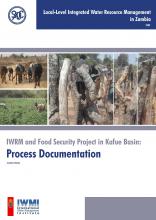Zambia
This process document reports on the integrated water resource management (IWRM) and food security project in Kafue Basin in Zambia. The project was aimed at demonstrating the food security, health, poverty reduction and ecological benefits of applying IWRM principles and practices. The scope of work included the following:
- Provision of improved technology for water abstraction, storage and supply for both domestic and productive use.
- Improvement of water resources management for enhanced availability of water.
- Rehabilitation of water facility infrastructure (boreholes, wells, dams/dykes for enhanced water accessibility and availability).
- Provision of market linkages and capacity building in water resources governance/management, conservation farming rain/food water harvesting.
Zambia has invested substantially in rural water supply since the early 1970s, but the actual number of people effectively provided with safe drinking water remains very low. It is estimated that only 37% of the population had access to safe water supply in 2000, a deprivation that has characterised and entrenched poverty in Zambia’s rural areas. Attempts to alleviate this poverty require a policy that favours a shift in emphasis from provision of safe water supplies to that encompassing productive water. The latter enables families to increase income and reduce costs of healthcare services for water-related illnesses. Gains in income generation will further enable communities to take care of their safe water needs, addressing the systematic challenge of sustainability in the delivery of rural water supply programmes. Under such favourable conditions rural communities can enjoy a life of quality and dignity.
Lessons learnt from the IWRM Demonstration projects on innovations in local-level Integrated Water Resource Development

